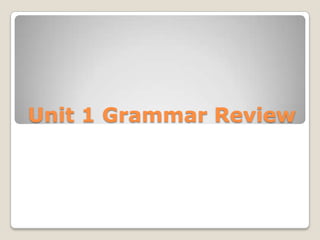
Unit 1 grammar review
- 1. Unit 1 Grammar Review
- 2. Remember a complete sentence must have a subject and a predicate. If it doesn’t, it is a FRAGMENT. ◦ Examples: When I was young and just starting out. (This is a clause with no subj or pred.) ◦ The giant, scary bear with the sharp claws and matted fur. (This is a subject with no predicate.) Fragments
- 3. Run-ons are sentences that are placed in the same sentence without a connector. ◦ The chair is comfortable it is made of leather. (run-on) ◦ This chair is comfortable and it is made of leather. (now it is a properly formed sentence) Run-ons
- 4. Imperative: this is a command. Like… ◦ Give me the book. ◦ Be ready for the game. Interrogative: These are questions. ◦ Who is the winner? ◦ How are you? Types of Sentences
- 5. Declarative: This is a sentence that just states something. ◦ My dog has fleas. ◦ That is a comfortable chair. Exclamatory: This sentence shows excitement or emotion. ◦ That was awesome! ◦ What an amazing job Types of Sentences
- 6. Every complete sentence has a subject and predicate. ◦ The yellow ribbon was tied around the tree. To find the subject and predicate, first find the verb… it is was tied. Ask, “What was tied?” Answer, The yellow ribbon. So, The Yellow ribbon is your subject. The verb was tied and EVERYTHING else is the predicate. The yellow ribbon was tied around the tree. Complete subject and predicate
- 7. Simple subject and predicate are just the subject without any adjectives and the verb by itself. The yellow ribbon was tied around the tree. Simple Subject and Predicate
- 8. Subject complements are sentences with linking verbs where a subject complement renames or describes the subject. ◦ Example: My mother is a nurse. (The subject complement renames mom as a nurse.) ◦ That movie was scary. (The subject complement scary describes the movie. Subject Complements
- 9. Subject Complements can either be predicate nouns and predicate adjectives. ◦ Predicate Nouns: My dog is a cocker spaniel. My house is a colonial. Your favorite subject is gym. ◦ Predicate Adjectives: You are beautiful. That boy is funny. Predicate Nouns and Adjectives
- 10. Object Complements are: ◦ Direct Objects ◦ Indirect Objects Object Complements
- 11. They are the noun being acted upon by the verb. You find them by asking “verb” what? ◦ Please give me a chance. Ask “give” what? The answer, a chance is your direct object. ◦ Bill sings that song beautifully. “Sings” what? That song Direct Objects
- 12. Indirect Objects are the nouns that something is done to or for. ◦ To find them ask “Verb” to or for whom or what? ◦ Example: Please give me the book. Ask, give to whom? Answer, Me is the indirect object. ◦ Bill wrote Sarah a note. Wrote to or for whom? Sarah is the indirect object!! Indirect Object